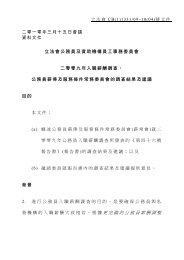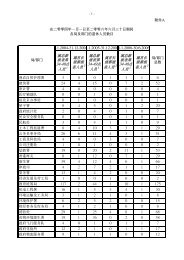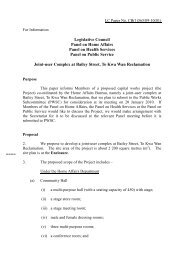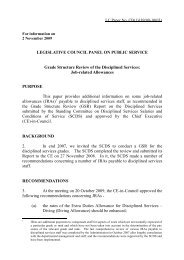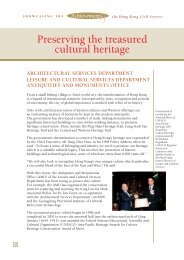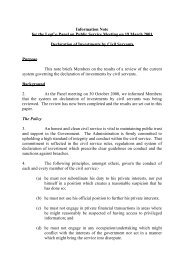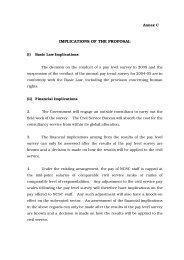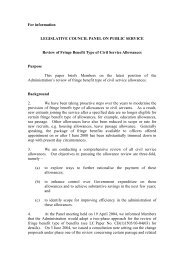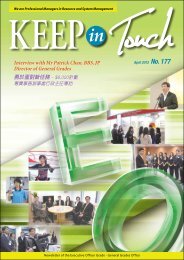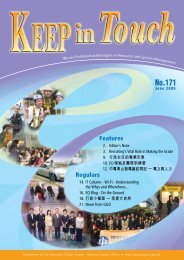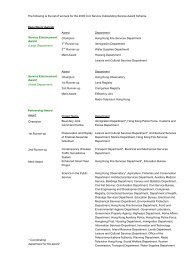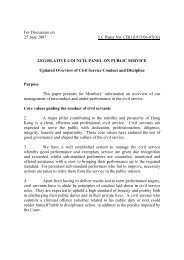Review of Post-service Outside Work for Directorate Civil Servants
Review of Post-service Outside Work for Directorate Civil Servants
Review of Post-service Outside Work for Directorate Civil Servants
You also want an ePaper? Increase the reach of your titles
YUMPU automatically turns print PDFs into web optimized ePapers that Google loves.
For in<strong>for</strong>mation<br />
on 19 October 2009<br />
LC Paper No. CB(1)34/09-10(02)<br />
Legislative Council Panel on Public Service<br />
<strong>Review</strong> <strong>of</strong> <strong>Post</strong>-<strong>service</strong> <strong>Outside</strong> <strong>Work</strong><br />
<strong>for</strong> <strong>Directorate</strong> <strong>Civil</strong> <strong>Servants</strong><br />
PURPOSE<br />
This paper in<strong>for</strong>ms Members on the outcome <strong>of</strong> the consultation on<br />
the recommendations <strong>of</strong> the Committee on <strong>Review</strong> <strong>of</strong> <strong>Post</strong>-<strong>service</strong> <strong>Outside</strong> <strong>Work</strong><br />
<strong>for</strong> <strong>Directorate</strong> <strong>Civil</strong> <strong>Servants</strong> (“<strong>Review</strong> Committee”).<br />
BACKGROUND<br />
2. The <strong>Review</strong> Committee submitted its report to the Administration on<br />
10 July 2009. As reported in the Panel paper (ref: LC Paper No. CB (1)<br />
2236/08-09 (01)) which was discussed by Members on 13 July 2009, the <strong>Review</strong><br />
Committee made a total <strong>of</strong> 23 recommendations, covering four different aspects<br />
<strong>of</strong> the control regime, namely (a) underlying principles; (b) policy objective; (c)<br />
design and operation <strong>of</strong> the control regime; and (d) public monitoring. For easy<br />
reference, a summary <strong>of</strong> these recommendations is at Annex.<br />
CONSULTATION<br />
3. Following the publication <strong>of</strong> the <strong>Review</strong> Committee’s report, the<br />
Administration conducted a two-month consultation with all the serving<br />
directorate civil servants, the staff sides <strong>of</strong> the four central staff consultative<br />
councils and the departmental/grade management on the recommendations<br />
therein. The Advisory Committee on <strong>Post</strong>-<strong>service</strong> Employment <strong>of</strong> <strong>Civil</strong><br />
<strong>Servants</strong> (“Advisory Committee”) and the Public Service Commission were also<br />
invited to tender their views. The Administration received over 90 submissions.<br />
A summary <strong>of</strong> the views expressed is set out below.
Annex<br />
Report on <strong>Review</strong> <strong>of</strong> <strong>Post</strong>-Service <strong>Outside</strong> <strong>Work</strong><br />
<strong>for</strong> <strong>Directorate</strong> <strong>Civil</strong> <strong>Servants</strong><br />
Summary <strong>of</strong> Recommendations<br />
Underlying Principles<br />
Recommendation 1:<br />
Protection <strong>of</strong> the public interest and protection <strong>of</strong> an<br />
individual’s right should continue to be the two<br />
principles underlying the Control Regime, with<br />
protection <strong>of</strong> the public interest taking precedence<br />
over protection <strong>of</strong> an individual’s right.<br />
Policy Objective<br />
Recommendation 2:<br />
The policy objective should be expanded to make<br />
specific references to (a) avoiding suspicion or<br />
perception <strong>of</strong> ‘deferred reward’; and (b) making<br />
good use <strong>of</strong> limited human resources. There is no<br />
need to make a specific reference in the policy<br />
objective to maintaining the attractiveness <strong>of</strong> the<br />
civil <strong>service</strong> as a career.<br />
Design and Operation <strong>of</strong> the Control Regime<br />
I. Specific Improvement Measures<br />
(a) Periods <strong>of</strong> Restriction<br />
Recommendation 3:<br />
A lifetime total ban on paid post-<strong>service</strong> outside<br />
work should not be imposed. A lifetime specific<br />
ban on particular types <strong>of</strong> post-<strong>service</strong> employment<br />
should also not be imposed (with the Honourable<br />
Albert Ho registering a different view). The
- 2 -<br />
Honourable Albert Ho considers that the possibility<br />
<strong>of</strong> a lifetime ‘employer-specific’ ban on a <strong>for</strong>mer<br />
directorate civil servant who has had dealings in<br />
land, property or award <strong>of</strong> franchise matters when in<br />
government <strong>service</strong> should be further explored.<br />
Recommendation 4:<br />
Recommendation 5:<br />
Recommendation 6:<br />
Recommendation 7:<br />
No change should be made to the minimum<br />
sanitisation period.<br />
The length <strong>of</strong> the control period should not be<br />
determined by specified fields <strong>of</strong> work during<br />
government <strong>service</strong>.<br />
The length <strong>of</strong> the control period should not be<br />
determined by post-<strong>service</strong> outside work in the<br />
same field as a directorate civil servant’s past<br />
government duties.<br />
The length <strong>of</strong> the control period should be as<br />
follows (with the Honourable Audrey Eu and the<br />
Honourable Albert Ho registering a different<br />
view) –<br />
(a) two years <strong>for</strong> <strong>Directorate</strong> Pay Scale (DPS) D1 to<br />
D3 (or equivalent) civil servants (i.e. no change<br />
to the length <strong>of</strong> the existing period);<br />
(b) three years <strong>for</strong> DPS D4 to D7 (or equivalent)<br />
civil servants (i.e. lengthening the existing<br />
period by one year); and<br />
(c) five years <strong>for</strong> DPS D8 (or equivalent) civil<br />
servants (i.e. lengthening the existing period by<br />
two years).<br />
The Honourable Audrey Eu and the Honourable<br />
Albert Ho recommend that the length <strong>of</strong> the control<br />
period should be –<br />
(a) three years <strong>for</strong> DPS D1 to D3 (or equivalent)<br />
civil servants (i.e. lengthening the existing<br />
period by one year); and
(b) Internal Assessment Process<br />
- 3 -<br />
(b) five years <strong>for</strong> DPS D4 to D8 (or equivalent)<br />
civil servants (i.e. lengthening the existing<br />
period by three years <strong>for</strong> DPS D4 to D7 (or<br />
equivalent) civil servants and by two years <strong>for</strong><br />
DPS D8 (or equivalent) civil servants).<br />
Recommendation 8:<br />
The provision <strong>of</strong> in<strong>for</strong>mation by an applicant in the<br />
application <strong>for</strong>m should be improved as follows –<br />
(a) irrespective <strong>of</strong> whether or not an applicant will<br />
be involved in the business <strong>of</strong> the parent or<br />
related companies <strong>of</strong> the prospective employer,<br />
he should be required to disclose his material<br />
past contractual, legal, <strong>of</strong>ficial and other<br />
contacts/dealings (if any) with these entities<br />
during his last three years <strong>of</strong> government <strong>service</strong><br />
if he is at DPS D1 to D3 (or equivalent), and<br />
during his last six years <strong>of</strong> government <strong>service</strong> if<br />
he is a DPS D4 or above (or equivalent) civil<br />
servant;<br />
(b) an applicant should be required to provide any<br />
other in<strong>for</strong>mation which he considers relevant to<br />
the assessment <strong>of</strong> his application; and<br />
(c) the policy objective and the assessment criteria<br />
should be stated upfront on the application <strong>for</strong>m<br />
so as to remind an applicant <strong>of</strong> the factors that<br />
would be taken into account in the assessment<br />
process. This should help him to decide what<br />
other relevant in<strong>for</strong>mation to provide as required<br />
under (b) above.<br />
Recommendation 9:<br />
All applications from DPS D4 to D8 (or equivalent)<br />
directorate civil servants should be assessed with<br />
reference to the applicants’ last six years <strong>of</strong> active<br />
government <strong>service</strong>.
- 4 -<br />
(c) External Assessment Process<br />
Recommendation 10:<br />
Recommendation 11:<br />
Recommendation 12:<br />
Recommendation 13:<br />
Recommendation 14:<br />
The Advisory Committee should retain its advisory<br />
role (with the Honourable Audrey Eu registering a<br />
different view). The Honourable Audrey Eu<br />
considers that the Control Regime, including the<br />
power to approve or reject post-<strong>service</strong> outside<br />
work applications, should be placed in a body<br />
independent <strong>of</strong> the Administration.<br />
The membership <strong>of</strong> the Advisory Committee should<br />
be expanded to nine members (including the<br />
chairman) with a broadened composition. Possible<br />
categories <strong>of</strong> candidates <strong>for</strong> appointment on an ad<br />
personam basis include (but not restricted to)<br />
academics, representatives from civil <strong>service</strong><br />
groups, <strong>for</strong>mer directorate civil servants,<br />
personalities from pr<strong>of</strong>essional fields and/or the<br />
business sector, as well as <strong>for</strong>mer or serving<br />
members <strong>of</strong> the Executive Council, the Legislative<br />
Council and the District Councils.<br />
The Advisory Committee should be given the power<br />
to invite outside expert(s) in the field(s) relevant to<br />
a post-<strong>service</strong> outside work application to give<br />
advice if necessary.<br />
The Advisory Committee should draw up guidelines<br />
on its mode <strong>of</strong> operation, which should provide <strong>for</strong><br />
the holding <strong>of</strong> meetings when appropriate or upon<br />
request by its chairman or any <strong>of</strong> its members. In<br />
addition, these guidelines should be made known to<br />
the public and applicants.<br />
The secretariat <strong>of</strong> the Advisory Committee should<br />
be independent <strong>of</strong> the <strong>Civil</strong> Service Bureau.<br />
Depending on workload, it may be a dedicated<br />
secretariat, or it may be an existing independent
- 5 -<br />
secretariat <strong>for</strong> advisory bodies on civil<br />
<strong>service</strong>-related matters with an expanded ambit.<br />
(d) En<strong>for</strong>cement <strong>of</strong> <strong>Work</strong> Restrictions Imposed<br />
Recommendation 15: The imposition and en<strong>for</strong>cement <strong>of</strong> work<br />
restrictions should be strengthened as follows –<br />
(e) <strong>Review</strong>/Appeal Channels<br />
(a) the current arrangement <strong>of</strong> imposing standard<br />
work restrictions and, where necessary,<br />
additional application-specific work restrictions<br />
should continue;<br />
(b) the decision authority should directly in<strong>for</strong>m the<br />
prospective employer <strong>of</strong> the work restrictions<br />
imposed on an applicant and <strong>of</strong> the requirement<br />
<strong>for</strong> the latter to notify and to seek prior approval<br />
from the decision authority if there is any<br />
material change to the work;<br />
(c) if the en<strong>for</strong>cement <strong>of</strong> work restrictions imposed<br />
on an applicant may involve certain<br />
bureaux/departments, the decision authority<br />
should also in<strong>for</strong>m them <strong>of</strong> the imposed work<br />
restrictions; and<br />
(d) an applicant who has taken up an approved<br />
post-<strong>service</strong> outside work should be required, as<br />
part <strong>of</strong> the approval conditions, to provide the<br />
decision authority with a copy <strong>of</strong> the signed<br />
employment agreement or appointment letter<br />
within 30 days <strong>of</strong> signature or issue as well as<br />
any material changes made later.<br />
Recommendation 16:<br />
The decision authority should set out the review and<br />
appeal channels when notifying an applicant <strong>of</strong> the<br />
decision on his application. The decision authority<br />
should, as a standard practice, seek the advice <strong>of</strong> the
- 6 -<br />
Advisory Committee again if an applicant seeks a<br />
review <strong>of</strong> the decision.<br />
(f) Per<strong>for</strong>mance Pledge on Processing Time<br />
Recommendation 17:<br />
The Administration should make a practicable<br />
per<strong>for</strong>mance pledge on the processing time, having<br />
regard to the recommended enhancement to the<br />
internal and external assessment processes.<br />
II. Other Improvement Measures<br />
(a) Integrity <strong>of</strong> the <strong>Civil</strong> Service<br />
Recommendation 18:<br />
The integrity enhancement initiatives should give<br />
greater emphasis on the importance <strong>of</strong> avoiding<br />
possible conflicts <strong>of</strong> interest by directorate civil<br />
servants, in particular the public concern over<br />
perception or suspicion <strong>of</strong> ‘deferred reward’, both<br />
during active government <strong>service</strong> and in the pursuit<br />
<strong>of</strong> post-<strong>service</strong> outside work.<br />
(b) ‘Exit Interview’<br />
Recommendation 19:<br />
The Administration should conduct an ‘exit<br />
interview’ with every departing directorate civil<br />
servant, and devise guidelines on the matters to be<br />
covered.<br />
(c) Pension Suspension <strong>for</strong> Taking up Employment with Specified<br />
Subvented Organisations<br />
Recommendation 20:<br />
The suspension <strong>of</strong> monthly pension payments to<br />
retired pensionable civil servants (directorate and<br />
non-directorate) working on a full-time and paid<br />
basis in the 16 specified subvented organisations<br />
should be discontinued (with the Honourable<br />
Audrey Eu and the Honourable Albert Ho<br />
registering a different view). These two members
- 7 -<br />
recognise the anomalies under the existing<br />
arrangement but consider that such recommendation<br />
should not be made in the absence <strong>of</strong> a general<br />
review on the employment <strong>of</strong> <strong>for</strong>mer civil servants<br />
in all other quasi-government agencies or publicly<br />
funded organisations.<br />
Public Monitoring<br />
I. Coverage <strong>of</strong> Public Register<br />
Recommendation 21:<br />
The public disclosure arrangement should be<br />
extended to cover junior directorate civil servants at<br />
DPS D1 to D3 (or equivalent) as well.<br />
II. Advisory Committee’s Advice<br />
Recommendation 22:<br />
The Advisory Committee’s advice on every<br />
approved and taken up post-<strong>service</strong> outside work<br />
should be disclosed on the public register.<br />
III. Advisory Committee’s Annual Report<br />
Recommendation 23:<br />
More in<strong>for</strong>mation should be included in the<br />
Advisory Committee’s annual report, including but<br />
not limited to the categorisation <strong>of</strong> employers <strong>of</strong><br />
approved and taken up post-<strong>service</strong> outside work,<br />
the cases on the public register on which the<br />
Advisory Committee’s advice and the final decision<br />
<strong>of</strong> the authority differs, and the guidelines on the<br />
mode <strong>of</strong> operation <strong>of</strong> the Advisory Committee.
2<br />
General comments<br />
4. Some respondents maintain that a person’s right to work and choice <strong>of</strong><br />
occupation are fundamental human rights and that civil servants are entitled to<br />
the same basic human rights as the community they serve. There<strong>for</strong>e, any<br />
restrictions imposed on senior civil servants’ right to work after leaving the<br />
Government should accord with the law and be the minimum necessary to<br />
achieve the legitimate objectives behind the restrictions. They are doubtful as to<br />
whether some <strong>of</strong> the <strong>Review</strong> Committee’s recommendations can stand up to the<br />
‘proportionality test’.<br />
5. Many respondents note that the current post-<strong>service</strong> outside work<br />
control regime <strong>for</strong> directorate civil servants is already among the most draconian<br />
in the world. They cannot see the justifications <strong>for</strong> imposing further restrictions<br />
to limit the freedom <strong>of</strong> work by directorate civil servants after leaving the <strong>service</strong>.<br />
Some <strong>of</strong> them maintain that imposing additional restrictions cannot address those<br />
cases that have attracted public concern in the past. They consider that the<br />
solution should be more vigorous vetting during the application stage and<br />
tightened monitoring after approval <strong>of</strong> an application.<br />
6. Some respondents consider that civil <strong>service</strong> pension, although paid<br />
after retirement, is a deferred remuneration <strong>for</strong> past <strong>service</strong>s rendered by civil<br />
servants while in <strong>service</strong>; and that it is not a <strong>for</strong>m <strong>of</strong> compensation <strong>for</strong> “buying<br />
out” a retired civil servant’s right to engage in paid employment. There<strong>for</strong>e,<br />
retired directorate civil servants’ right to work cannot and should not be<br />
diminished because <strong>of</strong> their receipt <strong>of</strong> a pension.<br />
7. Some respondents note that civil servants are already subject to the<br />
provisions in the Prevention <strong>of</strong> Bribery Ordinance (Cap 201) and the Official<br />
Secrets Ordinance (Cap 521). They consider that any additional post-<strong>service</strong><br />
control should take account <strong>of</strong> this and should be limited to the extent necessary<br />
to achieve legitimate and reasonable objectives.<br />
8. Some respondents are concerned that the proposed tightened<br />
restrictions would impact more severely on civil servants on agreement terms<br />
than those on pensionable terms, owing to the <strong>for</strong>mer’s shorter leave entitlement,<br />
smaller accumulated leave balance, greater possibility <strong>of</strong> leaving the Government
3<br />
be<strong>for</strong>e retirement age, and lack <strong>of</strong> pension benefits on departure from the<br />
Government. Some other respondents note that directorate civil servants in<br />
some pr<strong>of</strong>essional disciplines may simply like to continue their pr<strong>of</strong>essional work,<br />
which would not compromise government or public interests. In addition, some<br />
pr<strong>of</strong>essions already have codes <strong>of</strong> conduct which provide adequate safeguards<br />
against conflict <strong>of</strong> interest. There<strong>for</strong>e, the post-<strong>service</strong> employment control <strong>of</strong><br />
directorate civil servants in such pr<strong>of</strong>essions does not seem necessary.<br />
9. Some respondents maintain that there should not be a one-size-fits-all<br />
control regime. They consider that controls and restrictions should not be<br />
imposed across the board without differentiating between different posts and job<br />
nature in the civil <strong>service</strong>.<br />
10. Some respondents contend that the controls imposed on directorate<br />
civil servants should not be more stringent than those imposed on political<br />
appointees.<br />
Underlying principles<br />
11. On the <strong>Review</strong> Committee’s recommendation that the protection <strong>of</strong><br />
the public interest should take precedence over protection <strong>of</strong> an individual’s right<br />
to work, the majority <strong>of</strong> respondents consider the two should be <strong>of</strong> equal<br />
importance. They note that a fine balance must be struck whenever there is a<br />
conflict between the protection <strong>of</strong> an individual’s fundamental rights and the<br />
protection <strong>of</strong> a legitimate public interest. And the Administration should, at the<br />
very start, set out how protection <strong>of</strong> the public interest and protection <strong>of</strong> civil<br />
servants’ right can be accommodated at the same time; and the control regime<br />
should also be able to respond to the actual circumstances <strong>of</strong> each case. Some<br />
respondents maintain that, since the right to work is a fundamental human right,<br />
it should not, as a matter <strong>of</strong> principle, be subordinate to the protection <strong>of</strong> public<br />
interest. And only where there are compelling reasons in a particular case<br />
should the protection <strong>of</strong> an individual’s fundamental right be interfered with.<br />
There should also be corresponding measures to ensure that a <strong>for</strong>mer directorate<br />
civil servant’s ability to provide <strong>for</strong> himself and his family is not affected.<br />
12. While agreeing that protection <strong>of</strong> the public interest should take<br />
precedence over an individual’s right, a respondent considers that it is also in the<br />
wider public interest to put human resources to good use by upholding <strong>for</strong>mer
4<br />
directorate civil servants’ right to pursue post-<strong>service</strong> outside work.<br />
Policy Objective<br />
13. On the <strong>Review</strong> Committee’s recommendation to expand the policy<br />
objectives to include avoiding suspicion or perception <strong>of</strong> deferred award, many<br />
respondents are concerned that the terms “perception”, “suspicion” and “deferred<br />
reward” are vague, subjective and lack clarity. Some maintain that the<br />
Administration would be adopting too low a threshold if it were to tighten the<br />
restrictions on directorate civil servants’ post-<strong>service</strong> livelihood in order to<br />
pre-empt a possibility that some post-<strong>service</strong> employment by <strong>for</strong>mer civil<br />
servants may raise suspicion or perception <strong>of</strong> conflict <strong>of</strong> interest in someone’s<br />
mind. Some respondents propose that the policy objective should state<br />
explicitly the mischief to be addressed, along the lines <strong>of</strong> the objective stated in<br />
the Canadian control regime. Others propose that if the <strong>Review</strong> Committee’s<br />
proposed policy objective were adopted, clear criteria and safeguards should be<br />
laid down to avoid unjustifiable suspicion or perception <strong>of</strong> “deferred reward”<br />
which is groundless or without any rational basis.<br />
14. Respondents generally do not support the <strong>Review</strong> Committee’s<br />
recommendation not to make a specific reference to maintaining the<br />
attractiveness <strong>of</strong> the civil <strong>service</strong> as a career in the policy objective. They<br />
consider that an unduly stringent control regime would not only impair the<br />
recruitment <strong>of</strong> high calibre persons to serve as civil servants, but would also<br />
affect the morale and integrity <strong>of</strong> the civil <strong>service</strong>.<br />
Periods <strong>of</strong> Restriction<br />
Sanitisation period<br />
15. Respondents support the <strong>Review</strong> Committee’s majority<br />
recommendation <strong>of</strong> not imposing a lifetime total ban on post-<strong>service</strong> work by<br />
directorate civil servants. They also consider the lifetime “employer-specific”<br />
ban recommended by some <strong>Review</strong> Committee members to be discriminative in<br />
nature.<br />
16. Respondents support the <strong>Review</strong> Committee’s recommendation that<br />
no change should be made to the minimum sanitisation period, as it is the longest
5<br />
amongst all the overseas control regimes studied. Some respondents maintain<br />
that the adoption <strong>of</strong> a blanket sanitisation period across the board is not fair to<br />
those <strong>for</strong>mer directorate civil servants whose post-<strong>service</strong> employment would not<br />
give rise to any conflict <strong>of</strong> interest or negative public perception. One<br />
respondent questions the necessity <strong>of</strong> imposing a sanitisation period on an<br />
ex-civil servant <strong>for</strong> taking up certain types <strong>of</strong> outside work, such as teaching or<br />
writing articles, which a serving civil servant would have been permitted to<br />
undertake upon application. The Administration is requested to re-consider the<br />
length <strong>of</strong> the sanitisation period in order to bring it in line with the more common<br />
and reasonable international practices.<br />
Control period<br />
17. Some respondents support the <strong>Review</strong> Committee’s recommendation<br />
to introduce a three-tier control period <strong>for</strong> directorate civil servants at different<br />
levels. Most respondents do not support the recommendation to lengthen the<br />
control period <strong>for</strong> the following reasons –<br />
(a)<br />
(b)<br />
(c)<br />
(d)<br />
(e)<br />
(f)<br />
the rationale <strong>for</strong> lengthening the control period by one year <strong>for</strong><br />
directorate civil servants at <strong>Directorate</strong> Pay Scale (DPS) D4 to D7 and<br />
two years <strong>for</strong> those at DPS D8 is not clear;<br />
the existing length <strong>of</strong> periods <strong>of</strong> restriction in the Hong Kong control<br />
regime is already among the longest compared to the seven overseas<br />
jurisdictions studied;<br />
those past cases that have given rise to public concern has nothing to<br />
do with the length <strong>of</strong> the control period;<br />
fine-tuning <strong>of</strong> the assessment/approval procedures would be more<br />
effective than lengthening the control period;<br />
a longer control period may deter persons <strong>of</strong> high calibre from joining<br />
the civil <strong>service</strong>, dampen serving civil servants’ aspiration to progress<br />
to the directorate level, and risk a drain <strong>of</strong> talents from the civil<br />
<strong>service</strong>; and<br />
the control period imposed on directorate civil servants should not be<br />
longer than that imposed on political appointees who are subject to<br />
greater risk <strong>of</strong> conflict <strong>of</strong> interest. The lengthening <strong>of</strong> the control<br />
periods <strong>of</strong> directorate civil servants would further widen the gap
6<br />
between the two control regimes.<br />
Internal Assessment Process<br />
18. On the <strong>Review</strong> Committee’s recommendation that an applicant should<br />
disclose his material past dealings with the prospective employer and its parent or<br />
related companies during his last three/six years <strong>of</strong> government <strong>service</strong> and any<br />
other in<strong>for</strong>mation which he considers relevant to the assessment <strong>of</strong> the<br />
application, some respondents maintain that the word “material” is open to<br />
interpretation and may give rise to unnecessary dispute, the term “related<br />
companies” is too broad and vague since a company can be “related” to other<br />
parties or businesses in various <strong>for</strong>ms and dealings and it would be very difficult<br />
<strong>for</strong> the applicant to be aware <strong>of</strong> all such connections and dealings. In addition,<br />
it may be against natural justice to put a burden <strong>of</strong> unspecified breadth and<br />
weight on an applicant to provide any other in<strong>for</strong>mation which he considers<br />
relevant. Some respondents advise there may be genuine difficulties <strong>for</strong> an<br />
applicant, who has already left the <strong>service</strong>, to provide very detailed in<strong>for</strong>mation<br />
concerning his last (up to) six years <strong>of</strong> government <strong>service</strong>.<br />
19. Some respondents also maintain that “material” past dealings should<br />
exclude the simple signing <strong>of</strong> contract/agreement or cases where the applicant<br />
had no involvement in the tender assessment/negotiation process.<br />
20. On the recommendation that an applicant should be required to<br />
provide any other in<strong>for</strong>mation which he considers relevant to the assessment <strong>of</strong><br />
his application, some respondents are against leaving it to the applicant to judge<br />
whether any other in<strong>for</strong>mation is relevant. An objective test would be more<br />
appropriate, and the Administration should give clear guidelines on the<br />
in<strong>for</strong>mation to be provided by an applicant.<br />
21. On the recommendation that all applications from directorate civil<br />
servants at DPS D4 to D8 (or equivalent) should be assessed with reference to the<br />
applicants’ last six years <strong>of</strong> active government <strong>service</strong>, while some respondents<br />
agree to adopt a uni<strong>for</strong>m benchmark <strong>for</strong> applicants <strong>of</strong> the same rank, there is<br />
concern about the staff resource implication on carrying out the assessment work.<br />
Some respondents opine that if the recommendation were adopted, the<br />
management should consider not posting D4 to D8 civil servants to more than
7<br />
one post during their last six years <strong>of</strong> <strong>service</strong>.<br />
External Assessment Process<br />
22. Respondents generally support the recommendation to retain the<br />
advisory role <strong>of</strong> the Advisory Committee. While most respondents are not<br />
against the recommendation to expand the membership <strong>of</strong> the Advisory<br />
Committee, they consider there should be some parameters to ensure a balanced<br />
composition. Some respondents question the necessity and effectiveness <strong>of</strong><br />
expanding the membership <strong>of</strong> the Advisory Committee. They consider it more<br />
important to identify individuals who are prepared to exercise due care and weigh<br />
the pros and cons fairly and sensibly. A few respondents are concerned that<br />
inclusion <strong>of</strong> individuals with political affiliations on the membership <strong>of</strong> the<br />
Advisory Committee may politicise its work.<br />
23. On the recommendation to invite outside expert(s) in the field(s)<br />
relevant to a post-<strong>service</strong> outside work application to give advice as necessary,<br />
some respondents are not clear under what circumstances would an expert be<br />
appointed and what issues would an expert be asked to advise on. Should this<br />
recommendation be accepted, they suggest there should be appropriate<br />
measures/safeguards to ensure that there is fair and careful selection <strong>of</strong> outside<br />
expert(s), that the expert(s) should keep confidential all the in<strong>for</strong>mation made<br />
available, and that there should also be procedural guidelines on the disclosure <strong>of</strong><br />
the advice from the expert(s) and an opportunity to comment on the advice<br />
rendered by the applicant concerned.<br />
24. One respondent suggests that the parties concerned should be allowed<br />
to comment on the guidelines on the mode <strong>of</strong> operation <strong>of</strong> the Advisory<br />
Committee in draft <strong>for</strong>m be<strong>for</strong>e they are finalised.<br />
25. Most respondents are not in favour <strong>of</strong> the recommendation that the<br />
secretariat <strong>of</strong> the Advisory Committee should be independent <strong>of</strong> the <strong>Civil</strong> Service<br />
Bureau (“CSB”), on the ground that the key to reassuring the public about the<br />
independence <strong>of</strong> the Advisory Committee rests with its members and the views<br />
they give. Since the secretariat only provides operational support, it does not<br />
matter that the secretariat is part <strong>of</strong> CSB. They are also concerned about the<br />
resource implications associated with the establishment <strong>of</strong> an independent<br />
secretariat.
8<br />
En<strong>for</strong>cement <strong>of</strong> <strong>Work</strong> Restrictions Imposed<br />
26. Respondents generally accept the recommendation on the<br />
Administration in<strong>for</strong>ming the prospective employer and relevant<br />
bureaux/departments <strong>of</strong> the work restrictions imposed on an applicant; and<br />
requiring the applicant <strong>of</strong> an approved post-<strong>service</strong> application to provide the<br />
decision authority with a copy <strong>of</strong> the signed employment agreement or<br />
appointment letter, subject to the compliance <strong>of</strong> the Personal Data (Privacy)<br />
Ordinance. Some respondents are concerned with the recommendation that an<br />
applicant who has taken up an approved post-<strong>service</strong> outside work should be<br />
required to in<strong>for</strong>m the decision authority <strong>of</strong> any material changes made later, on<br />
the ground that the word “material” is open to interpretation. One respondent<br />
maintains that it should suffice <strong>for</strong> the applicant <strong>of</strong> an approved post-<strong>service</strong><br />
application to provide the relevant parts <strong>of</strong> the signed employment agreement or<br />
appointment letter in order not to discourage prospective employers from hiring<br />
<strong>for</strong>mer civil servants.<br />
<strong>Review</strong>/Appeal Channels<br />
27. Respondents support the recommendation on setting out clearly the<br />
review and appeal channels when notifying an applicant <strong>of</strong> the decision on his<br />
application. One respondent suggests that review <strong>of</strong> the decision on an<br />
application should be conducted in a timely manner.<br />
Per<strong>for</strong>mance Pledge on Processing Time<br />
28. Respondents support the drawing up <strong>of</strong> a per<strong>for</strong>mance pledge on the<br />
processing time <strong>of</strong> post-<strong>service</strong> applications by the Administration. Some<br />
suggest that the time should be no more than one to three months. One<br />
respondent proposes that the Administration should consult with the individual<br />
departmental management to come up with a realistic per<strong>for</strong>mance pledge.<br />
Integrity <strong>of</strong> the <strong>Civil</strong> Service<br />
29. Some respondents support the recommendation on placing greater<br />
emphasis on the importance <strong>of</strong> avoiding conflicts <strong>of</strong> interest by directorate civil<br />
servants in the Government’s future integrity management initiatives. Other
9<br />
respondents maintain that there are already adequate rules and regulations<br />
governing serving <strong>of</strong>ficers’ conduct in relation to actual or perceived conflict <strong>of</strong><br />
interest, and statutory criminal provisions under the Prevention <strong>of</strong> Bribery<br />
Ordinance and other Ordinances guarding against serious <strong>of</strong>fences such as<br />
corruption, misconduct in public <strong>of</strong>fice, etc.<br />
Exit Interview<br />
30. Most respondents do not consider an exit interview necessary and<br />
value-adding. They consider the provision <strong>of</strong> clear guidelines on the taking up<br />
<strong>of</strong> post-<strong>service</strong> outside work to each departing directorate civil servant would<br />
suffice. One respondent suggests the provision <strong>of</strong> the guidelines to a departing<br />
civil servant during the exit interview. Another respondent considers that an<br />
exit interview should be conducted as and when a directorate civil servant<br />
submits an application <strong>for</strong> post-<strong>service</strong> employment.<br />
Pension Suspension <strong>for</strong> Taking up Employment with Specified Subvented<br />
Organisations<br />
31. Most respondents support the <strong>Review</strong> Committee’s recommendation<br />
on the discontinuation <strong>of</strong> the pension suspension arrangement, on the ground that<br />
pensions are part <strong>of</strong> the remuneration <strong>for</strong> past <strong>service</strong>s rendered by civil servants<br />
while in <strong>service</strong> and should not be taken away on the basis <strong>of</strong> the identity <strong>of</strong> their<br />
post-<strong>service</strong> employers. They also consider discontinuation <strong>of</strong> the arrangement<br />
would remove the existing anomaly whereby retired civil servants in receipt <strong>of</strong><br />
pensions and taking up employment with public-funded bodies not on the<br />
specified list would not have to be subject to pension suspension. A few<br />
respondents suggest that the discontinuation <strong>of</strong> the pension suspension<br />
arrangement should also cover post-<strong>service</strong> employment with the Government by<br />
a retired civil servant in receipt <strong>of</strong> civil <strong>service</strong> pension benefits.<br />
Coverage <strong>of</strong> Public Register<br />
32. Divergent views are received on the recommendation to extend the<br />
public disclosure arrangement to cover post-<strong>service</strong> work <strong>of</strong> junior directorate<br />
civil servants at DPS D1 to D3 (or equivalent). Some respondents suggest that<br />
the proposed extension should be applied on a case-by-case basis taking into<br />
account the nature <strong>of</strong> an approved post-<strong>service</strong> employment and the previous
10<br />
government duties <strong>of</strong> the applicant concerned, and that such disclosure should<br />
cease three years after the departure <strong>of</strong> the applicant from the civil <strong>service</strong>.<br />
Some respondents consider there are no strong justifications <strong>for</strong> the proposed<br />
extension. Some other respondents maintain that that the proposed extension<br />
would not improve the effectiveness <strong>of</strong> the control regime.<br />
Advisory Committee’s Advice<br />
33. Respondents endorse the recommendation to disclose the advice <strong>of</strong><br />
the Advisory Committee on each approved application <strong>for</strong> post-<strong>service</strong> outside<br />
work. Some respondents suggest that the Advisory Committee’s rationale <strong>for</strong> its<br />
advice should also be made available to enhance transparency <strong>of</strong> the process; and<br />
that the Administration should provide an explanation should it decide not to<br />
accept the advice <strong>of</strong> the Advisory Committee.<br />
WAY FORWARD<br />
34. The Administration is considering the views received and seeking<br />
legal advice on a number <strong>of</strong> issues. It will <strong>for</strong>mulate its stance <strong>for</strong> the<br />
consideration and decision <strong>of</strong> the Chief Executive in Council in due course.<br />
<strong>Civil</strong> Service Bureau<br />
October 2009




